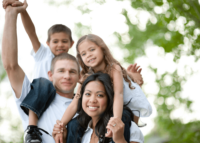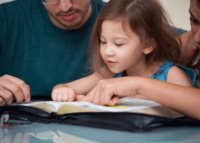How to talk to your kids about world events

At 6:29 pm on Saturday, July 13th, a notification on my phone alerted me that there had been an attempt to assassinate former President Trump at a campaign rally in Pennsylvania. I quickly dropped what I was doing to scour social media for more details. Over the next few hours, I didn’t just read about the events; I saw them with my own eyes. We now have a front seat for world events. Do you know who else has a seat? Your child.
News has changed for all of us.
Social media has changed how we get our news and who gets it. While your children may have never watched the evening news, they encounter news every time they log into social media. With 51% of teens spending four or more hours on social media daily[1], they know far more about current events than most parents realize.
Suppose your child had access to social media the days after the assassination attempt. In that case, they were watching actual videos from the scene that included former President Trump shot in the ear, blood-stained bleachers, and the lifeless body of the shooter positioned atop a nearby building. If you mix these images with social media comments found online after the event, it was a lot to process mentally.
I fear for children, pre-teens, and teens who viewed all of this content and were left to process it on their own without anyone to discuss the reality of what they had seen. In some extreme cases, viewing violent news content online can trigger a genuine trauma response. As parents, we need to create a space to discuss events like this with our children because if we don’t, our children will either internalize what they see or turn to other people or platforms for those discussions.
There is a battle for influence.
In December the Wall Street Journal created several accounts on TikTok that were configured to appear as 13-year-olds[2]. Videos on the war between Israel and Hamas were front and center. Even more troubling was the algorithm that presented these accounts with videos mostly from one side of the conflict. If these accounts were actual 13-year-olds, their viewpoint would likely be dictated by whatever the algorithm chose to show them rather than by an analysis of both sides.
I have spoken to multiple parents surprised to find their child, who had always seemed disinterested in current events, suddenly developed a strong opinion on this war. In these cases, their child was engaging with specific accounts, usually of well-known influencers, discussing this conflict. If we don’t discuss major world events with our children, many on TikTok, Instagram, and YouTube are waiting to take our place.
Your child needs you to talk about it.
As the generation of pre-teens, teenagers, and young adults have become constantly connected to our digital world, their mental health has taken a historic nosedive. Dr. Jean Twenge stated in her book Generations that “Every indicator of mental health and psychological well-being has become more negative among teens and young adults since 2012…The trends are stunning in their consistency, breadth and size.” Many see the world as increasingly scary, with less hope for the future than previous generations.
One of our responsibilities as parents is to give our children context and a framework for what they will encounter in this world. Their generation will consume more media than any other generation in history, and they need our help to consume this content critically, knowing that not everything they see is right or even true. They also need to understand what the Bible says about events like this and know where to place their hope.
Talking with my kids.
Since we had family visiting our home the weekend of the assassination attempt, my children didn’t find out much about the event on Saturday night. As they got in my truck to head to church on Sunday morning, I knew we needed to talk. Even though my teenage children aren’t on social media, I knew that many of their friends they would see at church are. I wanted them to hear about this event from me, and I wanted them to know my thoughts on it.
Because I’ve driven this route almost every Sunday for the last decade, I knew I had about twenty-five minutes with a captive audience. I took a breath and then started to explain the previous day’s events to my twin 15-year-old boys and my 14-year-old daughter. I let them ask questions about what happened, and to my surprise, they only had a few. By the time the truck pulled into the church parking lot, we had discussed the key points, and I felt confident they wouldn’t get caught off guard by one of their friends or classmates at church.
While my kids had a few questions later in the day, that original discussion, which lasted about twenty minutes, was precisely what I needed to give them a framework for understanding the horrible event of the previous day.
You can start the conversation.
All too often, important conversations can be challenging to start. As parents, we can worry if we are saying the right things, and we also have a list of topics we likely want to avoid. I want to encourage all of you that the worst thing you can do is to do nothing.
At what age should you start having these conversations? I recommend starting when your child reaches 10, but you will have to use your parental discernment. If your child is around older classmates or family members, you may need to start sooner. You will also need to use your discernment about how deep you go into the event.
When discussing a big world event, I recommend parents do four things:
- Explain the basics of what happened in an age-appropriate way. As you give this account, be sure to remain calm. Our children can detect our anger or anxiety, leading us to transfer those feelings to them. When it comes to the assassination attempt, your explanation for younger children might be as simple as “Someone tried to hurt our previous President.”
- Allow your child to ask any questions about the event. Your child will likely want to know more specifics than you share, which is okay. Let them know if they ask a question you don’t know the answer to. You don’t have to answer every question about every event, but you should try to answer every question appropriate for a child their age.
- Remind your child of God’s promises. Your child needs to hear that if we are followers of Jesus, God will never leave us or forsake us (Hebrews 13:5), all things are working together for good (Romans 8:28), and He will eventually make all things new without the evil of sin (Revelation 21:5).
- Take time to pray together. It can be easy to skip this step, but it is critical. By showing your child that you are taking your concerns to God, you are teaching them to do the same when they encounter something difficult. It also enables you to model what praying for those affected by this tragedy looks like.
Don’t miss the opportunity.
As parents, we have both a burden and an opportunity that comes from a major news event like the assassination attempt on President Trump. There is the burden of continuing to reveal to our children that our world is broken due to sin and that bad things can and often do happen. God gives us promises to offset this burden, bringing us to our opportunity. We can provide our children a framework for understanding and living with these events in a way that leads them to God and not away from Him. Don’t miss this opportunity–too much is at stake.
[1] Rothwell, Jonathan. “Teens Spend Average of 4.8 Hours on Social Media Per Day,” Gallup, Accessed July 18, 2024. https://news.gallup.com/poll/512576/teens-spend-average-hours-social-media-per-day.aspx.
[2] Sam Schechner et al., “How TikTok Brings War Home to Your Child,” The Wall Street Journal, December 22, 2023, https://www.wsj.com/tech/tiktok-israel-gaza-hamas-war-a5dfa0ee.
Consider a few extra resources:







